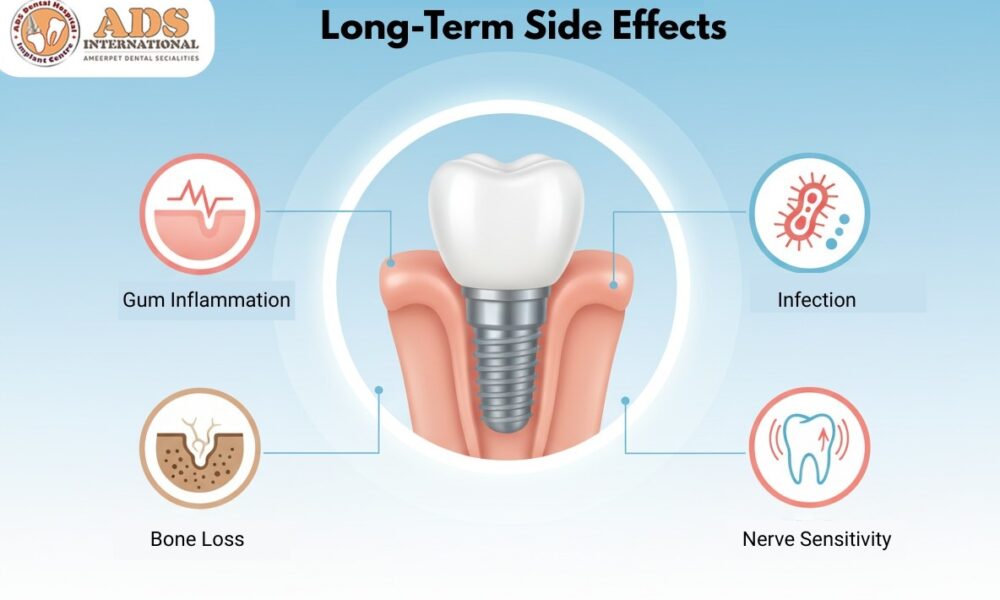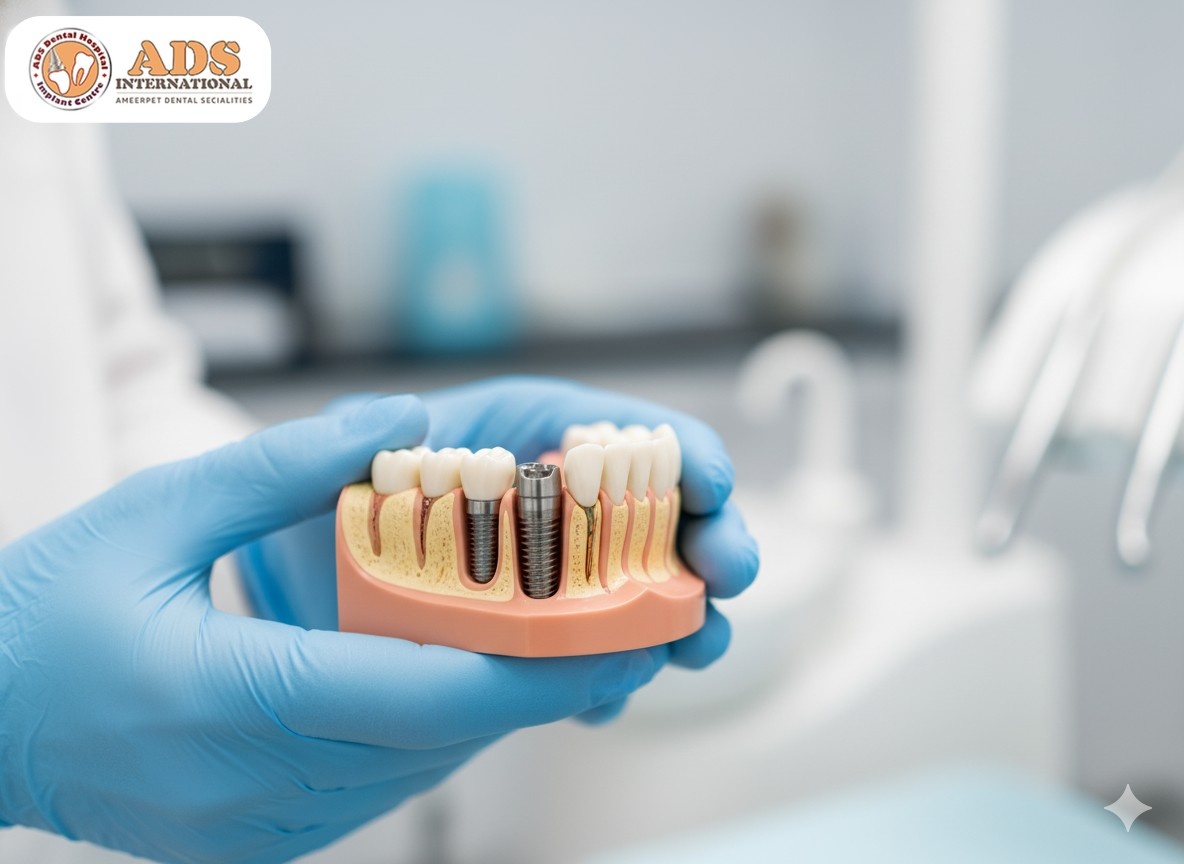Dental implants have become one of the most trusted and long-lasting solutions for replacing missing teeth. They restore function, aesthetics, and confidence with remarkable success rates. However, just like any surgical procedure, it’s essential to understand the possible side effects of dental implants, both short-term and long-term.
While most patients enjoy lasting success with minimal issues, knowing what could go wrong helps you identify early warning signs and seek timely care. Let’s explore the potential side effects of dental implants, how to prevent them, and what to expect during your recovery journey.
Table of Contents

An infection at the implant site is one of the most common side effects of dental implants. It can occur if bacteria enter the surgical area during or after placement. Practising proper oral hygiene and following your dentist’s aftercare instructions can help prevent infection and promote healing.
If an implant is positioned too close to a nerve, it can cause nerve damage, resulting in temporary or prolonged numbness, tingling, or pain in the lips, gums, or chin. Accurate placement guided by digital imaging significantly reduces this risk.
Mild pain or discomfort after surgery is expected and can be managed with prescribed medication. However, if you experience chronic jaw pain or persistent soreness, it could indicate pressure or irritation around the implant site.
Minor swelling, bruising, or bleeding around the surgical site is part of the natural healing process. These symptoms typically resolve within a few days. Using cold compresses and resting adequately helps manage these short-term side effects of dental implants.
Some patients may experience an allergic reaction to titanium or other materials used in the implant. Symptoms may include redness, itching, or discomfort. If you have a known metal allergy, alternative materials can be used safely.
Implant failure occurs when the implant doesn’t fuse properly with the jawbone. Poor oral hygiene, smoking, or medical conditions like diabetes can increase this risk. Though rare, implant rejection can also happen if the body doesn’t accept the foreign material.
Gum recession or peri-implantitis (inflammation of the tissue around an implant) are long-term side effects of dental implants that can lead to bone loss. Regular dental cleanings and proper oral hygiene practices help prevent these complications.
Over time, excessive bite force may cause a loosened implant or screw loosening in the abutment. Routine dental check-ups can ensure your implant remains stable and functioning properly.
Nearby teeth or gums can sometimes experience soft tissue irritation during or after implant placement. Careful surgical technique prevents this issue in most cases.
Patients who require bone grafting before implant placement may face extended healing times. In rare cases, implant fracture can occur due to excessive pressure or improper bone support.
When crowns are attached using dental cement, cementation failure can result in loosening or micro-leakage, leading to infection. Using screw-retained crowns often helps prevent this.
Implants placed in the upper jaw can sometimes interfere with the sinus cavity, causing sinus issues like congestion or discomfort. This can be prevented through proper sinus lift procedures.
Contact your dentist immediately if you notice:
- Persistent or worsening jaw pain
- Continuous bleeding or pus-like discharge
- Tender lymph nodes or swelling near the neck
- Movement or shifting of the implant
- Difficulty chewing or speaking
Ignoring these symptoms could lead to serious side effects of dental implants or long-term complications.
To minimise the side effects of dental implants, patients should:
- Follow all post-surgery instructions carefully
- Maintain excellent oral hygiene to prevent infection
- Avoid smoking and excessive alcohol consumption
- Attend regular dental follow-ups
- Eat a balanced diet to support gum and bone health
Prevention is always better than cure — early intervention ensures implant longevity and healthy tissue support.
At ADS Dental Hospital, we believe informed patients make the best decisions for their smiles. Our team of skilled implantologists combines precision, technology, and experience to minimise the side effects of dental implants and ensure long-term success.
From advanced 3D imaging to meticulous planning and gentle aftercare, every step of your treatment is designed to ensure comfort, safety, and lasting results. Whether you’re planning your first implant or addressing a complication, we’re here to guide you with compassionate, expert care.
Schedule your consultation today and experience peace of mind with our advanced implant solutions!
1. Are side effects of dental implants common?
Most side effects, like swelling, pain, or bruising, are mild and temporary. Serious complications such as implant failure or nerve damage are rare when performed by an experienced implant specialist.
2. Can nerve damage from dental implants be repaired?
In many cases, mild nerve damage heals over time. If pressure from the implant causes persistent numbness or pain, early treatment can help restore sensation.
3. Can implants cause health problems?
Serious health issues are rare. However, infections, allergic reactions, or gum inflammation can occur if oral hygiene and follow-ups are neglected.
4. Can a dental implant cause problems years later?
Yes, long-term issues like gum recession, bone loss, or loose implants can develop if maintenance is poor. Regular dental visits help prevent these complications.

